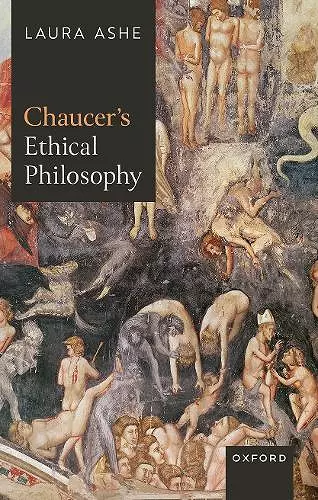Chaucer’s Ethical Philosophy
Exploring Chaucer's engagement with modern ethical questions
Format:Hardback
Publisher:Oxford University Press
Published:4th Feb '25
Should be back in stock very soon

This insightful exploration reveals how Chaucer’s Ethical Philosophy engages with timeless ethical questions through Chaucer's narratives, connecting medieval thought with contemporary philosophical debates.
In Chaucer’s Ethical Philosophy, the author delves into the intricate relationship between Chaucer's literary works and pressing modern questions of political and moral philosophy. Through a close examination of key texts such as Troilus and Criseyde, The Canterbury Tales, and The Book of the Duchess, the book reveals how Chaucer's narratives engage with ethical dilemmas that resonate with contemporary debates. The analysis highlights Chaucer's forward-thinking approach to issues of subjectivity, recognition, agency, and moral responsibility, illustrating how these themes are woven into the fabric of his storytelling.
The book positions Chaucer in conversation not only with medieval philosophical and theological thought but also with significant modern philosophers such as Hegel, Levinas, and Wittgenstein. By exploring these connections, Chaucer’s Ethical Philosophy demonstrates that the ethical questions posed by Chaucer are not merely historical artifacts but rather vital inquiries that continue to shape our understanding of human relationships today. The author emphasizes the relevance of medieval narrative forms in tackling concepts traditionally viewed as modern, thus bridging the gap between past and present.
Ultimately, this work invites readers to reconsider the complexities of ethical thought as expressed in Chaucer's fiction. It challenges us to reflect on the fundamental ethical question of how we should treat one another, revealing that Chaucer's literary experiments possess a philosophical depth that remains impactful in contemporary discourse. Through this lens, the book underscores the enduring significance of medieval perspectives in understanding the moral landscape of the modern world.
Ashe gives us a Chaucer whose narratives are driven by ideas, who truly sees women as human beings, and who values human love in ways that reach beyond the norms of his time ... The prose style is passionate and charismatic throughout, and I found it refreshing to read scholarly work that dares to register an affective response to narratives of appalling suffering and dizzying joy. One achievement of this book is the way it gives readers permission to be moved by Chaucer's stories. Treating them as philosophical thought experiments does not, it turns out, attenuate their emotional resonance; on the contrary, this approach invites analogies to our own lived experiences as subjects navigating the world, such that Ashe's philosophical reading of Chaucer is also, and wonderfully, a personal one. * Megan Murton, Review of English Studies *
In this thoughtful and eloquent book, Laura Ashe establishes Chaucer's credentials as a moral philosopher. The argument is not that he wrote philosophical treatises, but rather that his fictions are imaginative "thought experiments" that explore the same big questions that have fascinated modern philosophers ... When sympathy with Chaucer's Christian beliefs can no longer be taken for granted, alternative philosophies are needed to make sense of Chaucer's ethics. Laura Ashe's book recognizes and satisfies that need. * Ad Putter, TLS *
ISBN: 9780198894964
Dimensions: 223mm x 145mm x 20mm
Weight: 398g
224 pages